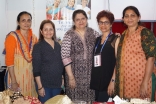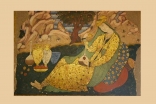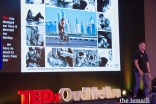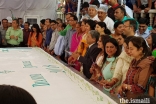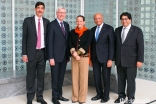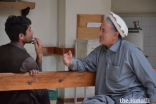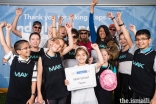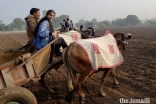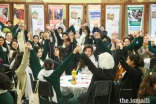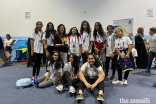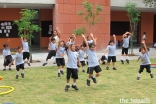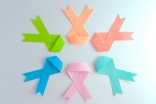Content Tagged with Global
On the occasion of International Women's Day, we celebrate the work of the Ismailia Helping Society (IHS) in India. Established in 1936, under the guidance of Mawlana Sultan Mahomed Shah, IHS was established to promote the economic advancement of women in the Jamat. Over 80 years later, IHS continues to empower women who leverage their traditional skills in art, crafts, and beadwork to create lifestyle products.
On the occasion of International Women’s Day, 8 March 2020, we celebrate the achievements of women — historical and contemporary — who have inspired and continue to inspire people of all faiths, backgrounds, and fields of endeavour.
Promoting inclusivity and accessibility, Ismaili Centres and Jamatkhanas around the world are opening their doors to dialogue and conversation – a cornerstone to pluralism and a long-standing tradition of our faith.
“Women are twice as likely as men to experience depression and anxiety, yet three times more likely to experience barriers to accessing mental healthcare,” explained Dr Simone Vigod during a session entitled Healthy Moms, Healthy Families – Breaking Down Barriers to Maternal Mental Healthcare at the Ismaili Centre Toronto in early February.
For nearly two decades, the United Bakers Co-operative Society Limited has been aggregating the interests and aspirations of local Jamati bakeries in Hyderabad. From centralised procurement to training and development, the alliance’s story illustrates that bonds of trust and collaboration can catalyse economic development. We take a look at the recipe behind their sweet story of success.
The University of Central Asia (UCA) and the University of Cambridge came together to sign historic partnership agreements at ceremonies in Cambridge and London on 25 and 26 February 2020. The events in the UK were attended by Princess Zahra, along with senior leaders from UCA and the University of Cambridge.
The percentage of elderly people in Pakistan is expected to double to 12 percent by 2050, increasing the number of senior citizens to 40 million. This demographic transition impacts citizens of all ages. Therefore, it is important that senior citizens take the necessary steps to ensure they have a good quality of life financially, even after retirement.
From organising skills enhancement camps to leading school fundraising teams, Ismaili youth from around the world have taken on leadership roles in the movement to alleviate poverty, through economic empowerment and other measures.
Although we now live in an an age of automation, it’s important to remember that machines can’t do everything. Technical efforts must be balanced with social and emotional skills. Part two of our Future Skills article highlights the importance of technical, cognitive, and soft skills in preparing for the future.
In December 2019, Global Encounters (GE) Expedition brought together young Ismailis from 13 countries to the rural areas of Southern Saurashtra in Gujarat to engage with the local Jamat and study the work of the Aga Khan Development Network (AKDN). The impact of Expedition on its participants is well known, but the impact that Expedition has on the Jamat in Southern Saurashtra is equally profound.
Often, we think of balance as a scale: having equal weights on either side. In reality, balance may not be what it seems. Instead, it can be thought of as a pendulum. It’s about finding what’s right for you. There isn’t a one size fits all, especially when it comes to wealth.
The World Economic Forum predicts that millions of jobs will be lost in the coming years as artificial intelligence, robotics, nanotechnology, and other socio-economic factors replace the need for human workers. How can we begin to prepare for a future that will no doubt be more mobile, autonomous, and machine-driven than today?
The sustainable development goals (SDGs) set forth by the United Nations (UN) in 2015 are envisioned to make the world a better place by 2030. In order to better understand the goals and their potential, the Ismaili Girl Guides in Pakistan attended a four-day summit at the Guides’ Association headquarters in Islamabad.
In an effort to achieve gender equality and the empowerment of women and girls through access to and participation in science, the United Nations recognises 11 February as International Day of Women and Girls in Science. Young girls from the Dubai Jamat have displayed that women and girls can thrive in the field of science by winning an award for their innovative solution at the FIRST Lego League (FLL) competition.
“Never limit yourself because of others’ limited imagination; never limit others because of your own limited imagination,” said Mae Jemison, an American engineer, physician, and the first African American woman to travel into space. She orbited the earth in 1992, making history as the first female person of color to journey into space about 30 years after the first man, Yuri Gagarin.
After the International Arts Festival held in Lisbon in July 2018, the number of Ismaili artists in Syria has increased, with the offering of intensive training and rehearsals organised by the Ismaili Council. A host of artists came together to perform on the occasion of Imamat Day in 2019.
The Syrian Jamat commemorated Imamat Day in 2019 by reminiscing about Jubilee Arts during an event where artists came together to perform traditional songs and dances, demonstrating dedication, passion, and excellence in their performances.
On the occasion of Children’s Mental Health Week, the Aga Khan Health Board (UK) explores the importance of supporting young people to pay attention to their emotional wellbeing, and shares some advice for children on being healthy, inside and out. We encourage you to read this article with the children in your life.
In part one, we observed five rapidly-developing technologies being regarded as potentially transformative. Here we take a look at four more innovations having a significant impact on the world of today and tomorrow.
Cancer is a global challenge: millions of people around the world are diagnosed with the condition every year. World Cancer Day is celebrated on 4 February, and unites people, communities, and countries to raise awareness, show support, and take action. Through prevention and early detection, the global community can reduce preventable suffering from cancer and non-communicable diseases.


